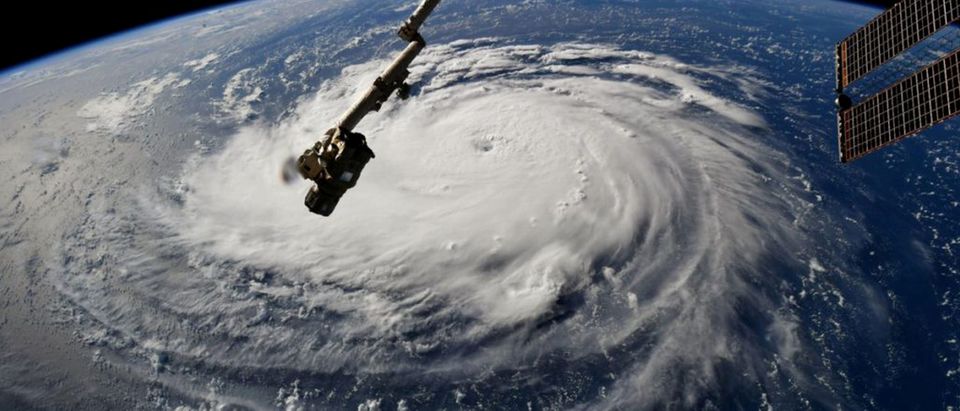- Climate scientists don’t all agree that global warming made Hurricane Florence worse.
- Scientist Judith Curry called such links “misleading to scientists, the public and policy makers.”
- “There is no reason to suggest that global warming” made Florence worse, scientist Cliff Mass said.
Hurricane Florence made landfall on Friday in North Carolina, bringing heavy rains and flooding. But before the storm touched down in the U.S., scientists and news outlets were already linking the storm to global warming.
However, not all scientists agree that man-made warming is making hurricanes, including Florence, bigger, slower and wetter as is often claimed in the media.
Climatologist Judith Curry called efforts by the “mainstream climate community” to link Florence to man-made global warming “woefully inadequate and misleading to scientists, the public and policy makers.”
“I’ve scratched the surface of the complex issues surrounding the weather and climate dynamics of Florence, but the take home point is that convincingly attributing any of this to human caused global warming is very challenging,” Curry wrote in a blog post on Tuesday.
Some climate scientists and media outlets argued “unusually warm waters” made Florence more powerful than would otherwise be the case. (RELATED: As Hurricane Florence Moves In, Democrats Are Holding Up Trump’s Pick To Head EPA’s Emergency Response Division)
Penn State University climate scientist Michael Mann and The New York Times’ climate team attributed warming in the Atlantic to global warming. The Times published a video before the storm hit claiming Florence “formed in unusually warm waters.”
“All else being equal, warmer oceans mean more energy to intensify tropical storms and hurricanes,” Mann wrote in The Guardian of Florence’s link to global warming. “All other things being equal, that implies about 10% more rainfall.”
While Florence did bring record rainfall to the Carolinas, was this because the warm waters “supercharged” the storm?
Probably not. An analysis of Florence’s path by Cato Institute meteorologist Ryan Maue showed ocean temperatures were “abnormally cool” for most of the storm’s trek through the Atlantic Ocean.
“Ryan Maue is absolutely correct,” University of Washington climate scientist Cliff Mass told The Daily Caller News Foundation.
Maue’s analysis not only showed that Florence formed, then strengthened, over relatively cool waters, but rapidly weakened once it reached warmer waters near the U.S. coast. Forecasters expected the storm to strengthen, but it was torn apart by wind shear, Mass said.
“There is no reason to suggest that global warming or an ‘ocean heat wave’ supercharged Hurricane Florence,” Mass said. “So the ‘ocean heat wave’ theory is obviously bogus.”
But what about the record rainfall? NPR’s science correspondent said scientists found that Florence was ” a lot wetter than it would have been in a cooler climate, 50 percent wetter.”
NPR’s reporter cited a study published before Florence even made landfall predicting global warming increased the size of the storm 50 miles larger and increased its rainfall by 50 percent. However, that study has not been updated after the storm to see how accurate it was.
When it came to this pre-event attribution study, Curry said the “climate models simply are not fit for this task.”
Mass also noted that “most of the major impacts of the storm was because it slowed down near the coast, causing an extended period of rain,” adding there’s “no credible theory of observational evidence that such slowing down has anything to do with global warming.”
Some scientists and reporters linked Florence’s slow speed to a study by University of Wisconsin-Madison scientist James Kossin showing a slowdown in tropical cyclone speeds since 1949.
Kossin told The Atlantic that “scientists have long hypothesized that tropical cyclones will move more slowly in a warmer world” in an article about Florence’s slowing down.
Kossin’s study, however, did not attempt to attribute it to either global warming or natural cycles. Kossin suggests global warming could be the culprit, but his study does not show it.
Curry noted that “the effect described by Kossin is very different from the out-and-out stall that we saw for Florence and Harvey in 2016.” Both storms slowed because of “blocking high pressure systems,” which is distinct from what Kossin looked at.
Follow Michael on Facebook and Twitter
All content created by the Daily Caller News Foundation, an independent and nonpartisan newswire service, is available without charge to any legitimate news publisher that can provide a large audience. All republished articles must include our logo, our reporter’s byline and their DCNF affiliation. For any questions about our guidelines or partnering with us, please contact licensing@dailycallernewsfoundation.org.


